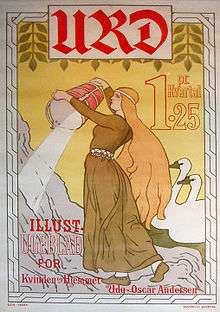Urðr

Urðr (Old Norse "fate"[1]) is one of the Norns in Norse mythology.[1] Along with Verðandi (possibly "happening" or "present"[2]) and Skuld (possibly "debt" or "future"[3]), Urðr makes up a trio of Norns that are described as deciding the fates of people. Urðr is attested in stanza 20 of the Poetic Edda poem Völuspá and the Prose Edda book Gylfaginning.
Urðr is together with the Norns located at the well Urðarbrunnr beneath the world ash tree Yggdrasil of Asgard. They spin threads of life, cut marks in the pole figures and measure people's destinies, which shows the fate of all human beings and gods. Norns are always present when a child is born and decide its fate. The three Norns represent the past (Urðr), future (Skuld) and present (Verðandi).[4][5]
Urðr is commonly written as Urd or Urth. In some English translations, her name is glossed with the Old English form of urðr; Wyrd.
References
- 1 2 Orchard (1997:169).
- ↑ Orchard (1997:174).
- ↑ Orchard (1997:151).
- ↑ Norner (Store norske leksikon)
- ↑ Nornor (Nordisk familjebok / Uggleupplagan. 19. Mykenai - Norrpada)
Sources
- Orchard, Andy (1997) Dictionary of Norse Myth and Legend (Orion Publishing Group) ISBN 0-304-34520-2
- Lindow, John (2001) Norse Mythology: A Guide to the Gods, Heroes, Rituals, and Beliefs (Oxford University Press) ISBN 0-19-515382-0
- Steinsland, Gro (2005) Norrøn religion : myter, riter, samfunn (Oslo: Pax forlag) ISBN 978-82-530-2607-7
- Bugge, Sophus (2010) Norroen Fornkvaedi (Nabu Press) ISBN 978-1-146-65668-9